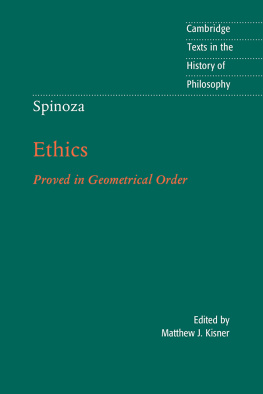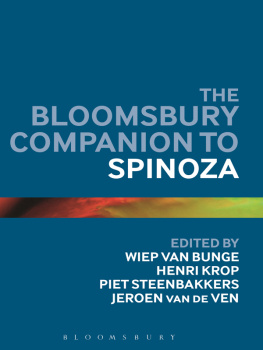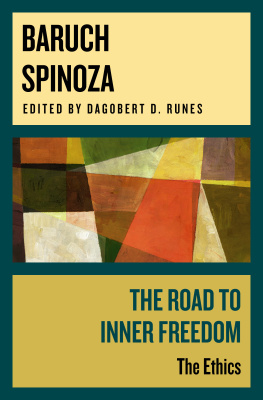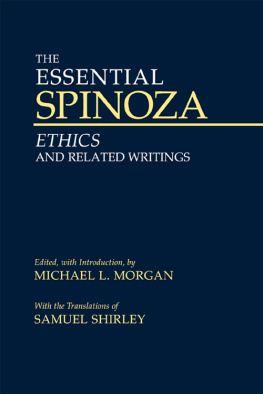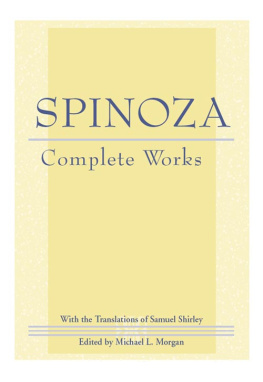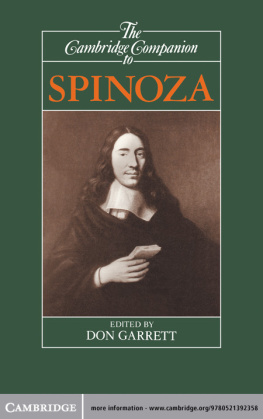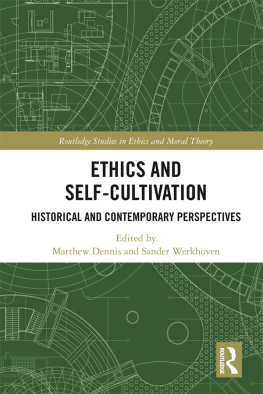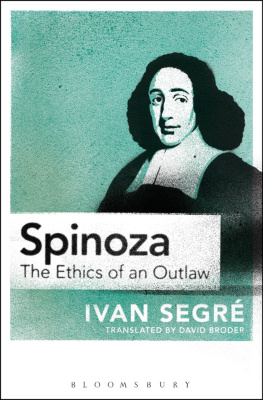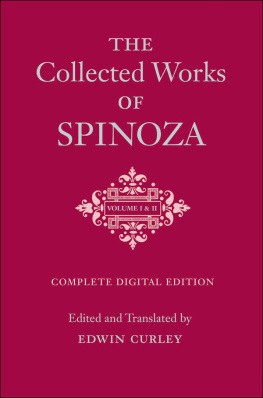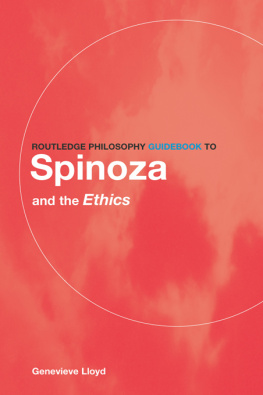Kisner Matthew (EDT) - Spinoza : Ethics: Proved in Geometrical Order
Here you can read online Kisner Matthew (EDT) - Spinoza : Ethics: Proved in Geometrical Order full text of the book (entire story) in english for free. Download pdf and epub, get meaning, cover and reviews about this ebook. year: 2018, publisher: Cambridge Univ Pr, genre: Religion. Description of the work, (preface) as well as reviews are available. Best literature library LitArk.com created for fans of good reading and offers a wide selection of genres:
Romance novel
Science fiction
Adventure
Detective
Science
History
Home and family
Prose
Art
Politics
Computer
Non-fiction
Religion
Business
Children
Humor
Choose a favorite category and find really read worthwhile books. Enjoy immersion in the world of imagination, feel the emotions of the characters or learn something new for yourself, make an fascinating discovery.
- Book:Spinoza : Ethics: Proved in Geometrical Order
- Author:
- Publisher:Cambridge Univ Pr
- Genre:
- Year:2018
- Rating:3 / 5
- Favourites:Add to favourites
- Your mark:
- 60
- 1
- 2
- 3
- 4
- 5
Spinoza : Ethics: Proved in Geometrical Order: summary, description and annotation
We offer to read an annotation, description, summary or preface (depends on what the author of the book "Spinoza : Ethics: Proved in Geometrical Order" wrote himself). If you haven't found the necessary information about the book — write in the comments, we will try to find it.
Spinoza : Ethics: Proved in Geometrical Order — read online for free the complete book (whole text) full work
Below is the text of the book, divided by pages. System saving the place of the last page read, allows you to conveniently read the book "Spinoza : Ethics: Proved in Geometrical Order" online for free, without having to search again every time where you left off. Put a bookmark, and you can go to the page where you finished reading at any time.
Font size:
Interval:
Bookmark:

Cambridge Texts in the History of Philosophy
Benedict de Spinoza
Ethics Proved in Geometrical Order
KARL AMERIKS
Professor of Philosophy, University of Notre Dame
DESMOND M. CLARKE
Emeritus Professor of Philosophy, University College Cork
The main objective of Cambridge Texts in the History of Philosophy is to expand the range, variety, and quality of texts in the history of philosophy which are available in English. The series includes texts by familiar names (such as Descartes and Kant) and also by less well-known authors. Wherever possible, texts are published in complete and unabridged form, and translations are specially commissioned for the series. Each volume contains a critical introduction together with a guide to further reading and any necessary glossaries and textual apparatus. The volumes are designed for student use at undergraduate and postgraduate level, and will be of interest not only to students of philosophy but also to a wider audience of readers in the history of science, the history of theology, and the history of ideas.
For a list of titles published in the series, .
Benedict de Spinoza
Ethics Proved in Geometrical Order
Edited by
Matthew J. Kisner
University of South Carolina
Translated by
Michael Silverthorne
and
Matthew J. Kisner


University Printing House, Cambridge CB 2 8 BS , United Kingdom
One Liberty Plaza, 20th Floor, New York, NY 10006, USA
477 Williamstown Road, Port Melbourne, VIC 3207, Australia
314321, 3rd Floor, Plot 3, Splendor Forum, Jasola District Centre, New Delhi 110025, India
79 Anson Road, #0604/06, Singapore 079906
Cambridge University Press is part of the University of Cambridge.
It furthers the Universitys mission by disseminating knowledge in the pursuit of education, learning, and research at the highest international levels of excellence.
www.cambridge.org
Information on this title: www.cambridge.org/9781107069718
DOI: 10.1017/9781107706972
Cambridge University Press 2018
This publication is in copyright. Subject to statutory exception and to the provisions of relevant collective licensing agreements, no reproduction of any part may take place without the written permission of Cambridge University Press.
First published 2018
Printed in the United Kingdom by Clays, St Ives plc
A catalogue record for this publication is available from the British Library .
Library of Congress Cataloging-in-Publication Data
Names: Spinoza, Benedictus de, 1632-1677, author. | Kisner, Matthew J., 1974- editor.
Title: Ethics / Benedict de Spinoza ; edited by Matthew J. Kisner, University of South Carolina ; translated by Michael Silverthorne and Matthew J. Kisner.
Other titles: Ethica. English
Description: New York : Cambridge University Press, 2018. | Series: Cambridge texts in the history of philosophy | Includes bibliographical references and index.
Identifiers: LCCN 2017055917 | ISBN 9781107069718 (hardback : alk. paper) | ISBN 9781107655638 (pbk. : alk. paper)
Subjects: LCSH: EthicsEarly works to 1800.
Classification: LCC B3973.E5 S55 2018 | DDC 170dc23
LC record available at https://lccn.loc.gov/2017055917
ISBN 978-1-107-06971-8 Hardback
ISBN 978-1-107-65563-8 Paperback
Cambridge University Press has no responsibility for the persistence or accuracy of URLs for external or third-party internet websites referred to in this publication and does not guarantee that any content on such websites is, or will remain, accurate or appropriate.
We would like to thank the late Desmond Clarke for his work in shepherding this volume from potentiality to actuality, and for his practiced hand as the series editor. We owe a debt of gratitude to Piet Steenbakkers and the late Fokke Akkerman for graciously agreeing to make their new critical edition available to us prior to its publication. Piet also provided helpful feedback on the translation and the Note on the text and translation. We would like to thank previous translators of the Ethics , Edwin Curley, Samuel Shirley and G.H.R. Parkinson, for all that we have learned from them. Matt would like to thank Desmond Clarke, Aaron Garrett, Ursula Renz, Sean Schifano and Harvey Shoolman for providing comments on the Introduction. Jeroen van de Ven was helpful in checking the chronology. Sam Newlands, Andrea Sangiacomo and Noa Naaman contributed to translating key terms; thanks to Sam for from the vantage of eternity. Finally, Matt would like to thank the University of South Carolina and his family (especially Lucy and Gracie) for their support in completing this project.
Spinoza makes frequent references to the various parts of the Ethics . For the sake of conciseness, we employ the following abbreviations in the translation of the text and throughout this volume.
aaxiom
appappendix
ccorollary
defdefinition
DOEDefinition of the Emotions
exexplanation
Llemma
pproposition
postpostulate
prefpreface
sscholium
The part of the Ethics is indicated by an arabic number at the beginning of the citation. So 4p37s1 refers to the first scholium of proposition 37 of Part Four.
In July of 1675 Spinoza travelled from his home in The Hague to Amsterdam to oversee the publication of his Ethics . He must have been bursting with excitement. The Ethics was the culmination of nearly fifteen years of philosophical reflection. It was also an astonishing intellectual achievement, as close as anyone had ever come to attaining the holy grail of early modern philosophy: an integrated and comprehensive system of thought, covering the gamut of philosophical topics, including God, physics, psychology, knowledge and ethics. Furthermore, the Ethics audaciously purports to prove this system on the basis of geometrical demonstration, the sort of rigorous proof famously employed by Euclid, which attains the highest degree of certainty.
Spinozas excitement was also mixed with trepidation, for he knew that the Ethics would be controversial, to say the least. The first reason for controversy was the Ethics s evident debt to Ren Descartes (15961650), the renowned natural philosopher and mathematician, who had become a polarizing figure in Dutch universities. In opposition to much of the Aristotelian philosophy that traditionally dominated universities, Descartes defended a mechanistic science, which was a cornerstone of what is known as the Scientific Revolution. Mechanistic science aims to explain natural systems as one would explain machines, in terms of the arrangement and movement of matter in space. In the Netherlands, where Aristotelianism had a more precarious foothold, various kinds of Cartesian philosophy spread rapidly among the faculty, particularly in Utrecht and Leiden. Cartesianism was met with hostility by conservative theologians such as Gisbertus Voetius (15891676) and Jacobus Revius (15861685), primarily because it threatened a strain of Protestant theology that draws on Aristotelian metaphysics. In an effort to keep the peace in the universities, the provincial councils of the States of Holland and West-Friesland declared that professors of philosophy must take an oath to cease propounding Cartesianism, although it would eventually come to dominate Dutch universities. While Spinoza was highly critical of Descartes, much of the Ethics proceeds from Cartesian starting points. Spinoza was also associated with Descartes because he had published a commentary on Descartess Principles of Philosophy , the only work to have been published under Spinozas name during his lifetime.
Font size:
Interval:
Bookmark:
Similar books «Spinoza : Ethics: Proved in Geometrical Order»
Look at similar books to Spinoza : Ethics: Proved in Geometrical Order. We have selected literature similar in name and meaning in the hope of providing readers with more options to find new, interesting, not yet read works.
Discussion, reviews of the book Spinoza : Ethics: Proved in Geometrical Order and just readers' own opinions. Leave your comments, write what you think about the work, its meaning or the main characters. Specify what exactly you liked and what you didn't like, and why you think so.

